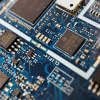Yellen's China trip yields long meetings, 'cordial' tone, but no consensus

US Treasury Secretary Janet Yellen went to Beijing with no expectations that meetings with China's new top economic officials would immediately ease tensions between the world's two largest economies.
There was no breakthrough. And it's far from clear whether the 10 hours of meetings, covering issues ranging from US technology export controls to China's new "anti-espionage" law and other punitive actions against US firms, will do anything to change the relationship's trajectory.
But Yellen met her objective of opening communications with her new Chinese counterpart, Vice Premier He Lifeng, and explaining US intentions on a broad range of policies.
"The accomplishment of the meeting was the meeting itself, not specific issues," said Scott Kennedy, a China economics expert at the Center for Strategic and International Studies in Washington. "We're starting from a point in which the two sides have barely spoken to each other in three and a half years and the level of mistrust and cynicism has been layered on so thick."
But he said it was significant that Yellen, He and other Chinese officials could hold civil, substantive discussions about policy differences after years of acrimony over the COVID-19 pandemic, tariffs, national security, trade restrictions and increasing difficulties for US firms in China.
China's state-run Global Times newspaper described the tone of Yellen's visit as "pragmatic" and "rational," but the "positive" expectations it generated are like "a candle in the wind, weak and uncertain."
"People are more inclined to believe that Washington's policy direction toward China is still focused on containment and suppression, and there has been no change in the securitization of economic and trade issues by the US," the nationalist tabloid said.
A senior US Treasury official accompanying Yellen on her first trip to China as secretary described it as "respectful, frank and constructive," adding: "She was warmly received."
Her meeting on Saturday with He, China's new economic czar, was scheduled for two hours but lasted five, followed by a "cordial" dinner, the official said.
Yellen also met with Chinese Premier Li Qiang and People's Bank of China Deputy Governor Pan Gongsheng during the trip, as well as senior executives of US companies doing business in China and six female economists to highlight the need for gender diversity.
Yellen told reporters that she and her Chinese counterparts aired "significant disagreements," and cited US concerns about China's "unfair economic practices" and recent punitive actions against US firms, including restrictions on critical semiconductor metals.
Among issues brought up by the Chinese side was President Joe Biden's consideration of a potential executive order to block billions of dollars in US investments into China related to sensitive technologies such as quantum computing and artificial intelligence.
Yellen said she told her Chinese counterparts that no decisions to proceed had been made, and any Treasury-administered investment curbs would be "highly targeted, and clearly directed, narrowly, at a few sectors where we have specific national security concerns."
Trade experts said after the meetings it was still difficult to see how Washington and Beijing would move towards compromise, but that it was better for the two sides to talk.
"I think Yellen struck the right tone, balancing efforts by the US government and businesses to de-risk and diversify supply chains with the reality that the United States and China still have an important economic relationship," said Jake Colvin president of the National Foreign Trade Council, which represents major US companies on trade matters.
Hong Hao, chief economist at Grow Investment Group in Hong Kong, said a possible outcome could be an easing of some tariffs on Chinese goods from a US review now underway.
"Yellen has a say in the next phase of the US's four-year tariff review," Hong said.
But Colvin said that with 2024 elections looming, it would be "politically difficult" for Biden to unilaterally ease tariffs or other restrictions without reciprocal action by China.
In the meantime, Yellen said the talks set the stage for more frequent US-China communications at the staff level about economic issues, including areas of disagreement.
Her visit is expected to be followed later this month by John Kerry, Biden's climate envoy, to discuss areas where the world's two largest carbon emitters could cooperate on fighting climate change. US Commerce Secretary Gina Raimondo has also expressed a desire to visit China.
The Yellen trip boosts chances for a meeting between Biden and Chinese President Xi Jinping later this year, said Wang Yiwei, an international relations professor at Renmin University in Beijing. A possible venue for this would be the Asia-Pacific Economic Cooperation summit in San Francisco in November.

 For all latest news, follow The Daily Star's Google News channel.
For all latest news, follow The Daily Star's Google News channel. 







Comments